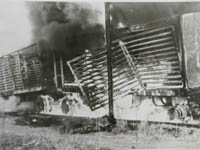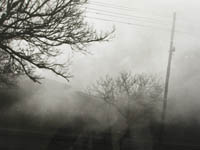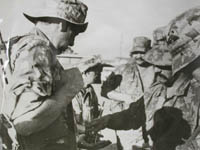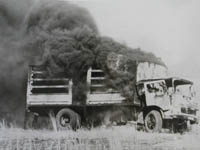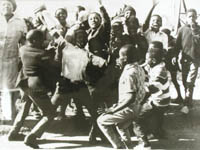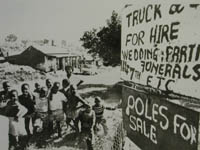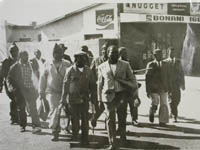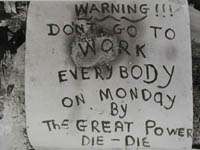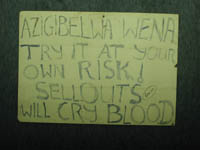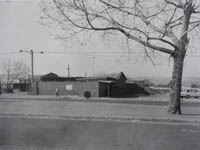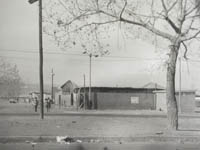Table of Contents
Acknowledgments Readers' Guide
Introduction The Narrative Official Stories The Participants Afrikaans Memory and Violence Final Thoughts Archive
Abbreviations Glossary
Gutenberg-e.org Columbia University Press
Life Histories: Four Voices
In the process of remembering, at any level—private/individual or collective/public—the individual always must negotiate the difficult terrain of the relationship between real physical violence (the "painful 'hard facts'" of lived experiences6) and, what is related to it, the processes of making meaning of all of the lived experiences and the meanings that have already been invented and created with the passage of time. Almost twenty years had passed when these four stories of Soweto were told in 1993, 1994, and 1995, respectively. Each person narrated a "factual" account of their lived experiences of the events of June 16.7 Each told the story of their experience of the uprising within the larger context of their lives. While not necessarily representative of all the groups in African society at this time, each of these four people represented diverse positions, ages, gender, and, in the different ways they were part of the uprising, four different inside perspectives and insights. Each had different personal memories of these events.
Lilli Mokganyetsi, now a schoolteacher and language specialist, mother of two, was 16 years old and a student in 1976. Zakes Molotsi, a former fighter of Umkhonto We Sizwe (the armed wing of the ANC), a "graduate" of eight years on Robben Island, was 22 years old and a factory worker in 1976. Patience Tshetlo, a domestic worker, a nanny and long-time cook, was 44 in 1976. At the time of the uprising, she was at home looking after her several young children. Sam Mashaba was 17 in 1976, a senior at Tshivase High School in Venda and already an active student organizer. Now he is a minister of the Seventh-Day Black Adventist Church. All four are parents.
Voices remembering in the present are never static (although their transcription fixes them), and they are usually not the same voice that spoke twenty years ago. These voices—all of them speaking in English—were recorded in 1993-95. They were remembering June 16, 1976. They were shaped and influenced by each speaker's experience, age/generation, gender, status/occupation, proximity to the struggle—all influences that have changed with time.8
^topBeginnings
Schoolchildren from junior secondary schools and high schools all over Soweto stood at the center of the uprising that began with the march protesting Afrikaans on June 16, 1976. However unruly or varied, the voices of these rebellious young men and women—boys and girls—affirm unequivocally and abundantly that they were the conscious, self-aware, often courageous if inexperienced protagonists of their own history.
25Of the four narrators, Lilli Mokganyetsi was the youngest in 1976, attending Form 2 (the equivalent of ninth grade in the United States) at a secondary school in Tladi, a part of Soweto. At 16, politics had not yet become relevant to her, and on the morning of June 16, 1976, she prepared herself as usual and then went to her school, bracing herself for the mathematics examination she was to take. Lilli: "You ultimately learn to know [Afrikaans]..." Lilli: "You ultimately learn to know [Afrikaans] ... not because you like it, but because you are being instructed with it. So now, as I say, I was intelligent, I could grasp [it] of course." All the instructions and questions would be put to her in Afrikaans, the language of the township administration and the apartheid government.
For many like her, the events of this day were at once heady and frightening, and the beginning of the protests came as a surprise. Lilli: "I saw a mob of people ..." Lilli: "It was during the first period, when the teachers were about to issue us with writing material and the question papers. You know … and I was, I wanted to sharpen my pencils, ja. Then I saw a mob of people coming. A mob of … they were of course in school uniform, singing songs that I have never heard of before. You know … as if they were coming … to, to, to, to … invade us, coming to hit us, or … you know, I started screaming, jaaiiee. Then, everyone in the school of course rose. You know, we joined them, because they came …" Lilli: "You know, I just joined in ..." Lilli: "You know, I just joined in [laughs] … we ran the streets of Soweto, getting into schools, collecting people. Not, no … you know … 'Black Power,' we were just doing, raising our fists, Black Power, Black Power, Black Power… We traveled the whole of Soweto…" Lilli: "I didn't know what was happening ..." Lilli: "People like us, of course, as I was still doing Form 2, I didn't know what was happening, in fact what was … why, all those points of view, because they said we were revolting against Afrikaans. But why?" Although not directly involved in its organization, young schoolchildren like Lilli were nevertheless drawn quickly into the march and its snarled aftermath. An old boyfriend grabbed Lilli's hand, and she quickly overcame her earlier hesitancy, getting swept up in the in the events of the day even though she was uncertain of the reason for the protests.
Slightly older than Lilli, Sam Mashaba was a senior student at Tshivase High School near Sibasa in Venda, one of the areas north of Johannesburg slated to become a "homeland" when the uprising began. Tshivase's distance from Soweto (several hundred kilometers) would have meant that Sam was physically removed from these events. But, as he explained, the "media, the newspapers, were very good about informing us about what was happening there. We had a newspaper that was banned eventually, which was called The World—it was a good paper which we used to read very much as students. So I would say that it offered us much information regarding what was taking place here." Sam: "Afrikaans has been known as the language of the oppressor ..." Sam: "[T]hey were having an interest then in doing away with Afrikaans as the medium of instruction in school, which was disturbing many black people for obvious reasons. Afrikaans has been known as the language of the oppressor, the oppressor of the fathers of the children who were then teenagers. And so Afrikaans was just an out language, it wasn't loved by many young people. So the objective there, the object that the students were really fighting against, and that I was fighting against there, was mainly Afrikaans as the medium of instruction.
Despite the physical distance, then, and what he called the "diverse different perspective" of students in the northern Transvaal, it was
clear that agendas and preoccupations in the north were not dissimilar and that protest action was not much different from that in Soweto.9 An established network of communications had linked the cities to the countryside well before
the uprising began.
Sam: "Guests that would be coming from the Reef ..." Sam: "We would have some speakers, some guests that would be
coming from the Reef here, Johannesburg, they would come and visit us and they would talk with us, you know, as the executive committee …
things of that sort.
[…]
And they would feed us the information as to what was happening there [in Soweto] and what we needed to do also, in turn. We had people also
in Venda, that were very, very good, some of them are still respected greatly today, who were elderly to us, and who would keep on informing us.
People such as Dean Farisani, people like Reverend Mashaba, who happens to be my elder brother, they were leaders of BPC there."
Every second week or so, as Sam Mashaba tells it, the students met with certain people at a mission station. Often members of the Black
Consciousness Movement, these visitors would meet with students—sometimes under the protection of a prayer or a choir meeting—to
help them understand political developments and planning elsewhere in the country, and so news of the beginning of the uprising did not
come as a surprise to Sam at all.
Zakes: "We knew about the demonstration ..." Zakes: "We, the people who were working, we knew about the demonstration that is on that day. But we all left for work… But on the day, around 11, 12 there were already news which was spreading throughout the factories. That Soweto is burning. So everybody started to leave the working place, so that we reach home very early. Because of the situation which has started. Such networks were often staffed by older students or by those, like Zakes Molotsi, who were no longer at school and were more experienced or otherwise involved in political activity. Zakes had a good sense of what was going to happen and was aware of the plan for demonstrations on June 16. Though he was perhaps not caught quite so badly off guard, he hardly anticipated what "the spark of Wednesday, June 16" would unleash.
Patience: "It was terrible. My little daughter ..." Patience: "It started early in the morning, but we heard about it, it was about two o'clock when it spread to our location, mmh. It was terrible. My little daughter, came with a … sweets, a packet of sweets. They were starting to loot … the trucks, everything was burning now that time. And it was worst during the night. The other location in front of Dobson street … oohoohooh … it was so many guns there the whole night, but they didn't find anybody. I think they were taking those who were shot there. Because we didn't see anyone there… [the police were taking the bodies away?] Yaah, mmh, immediately, because you couldn't find anybody. I remember, it was, because they were burning the bottle store, they were looting beers everything." For those like Patience Tshetlo who were removed more by age than by physical distance from the march and the exploding conflict, the shock was almost palpable and the distance quickly evaporated with the realization that it was their children who stood at the center of the shots and the flames.
30
Lilli: "Smoke from burning cars ..." Lilli: "… at about five p.m., everything was, … all the, … the whole
location as it was, it was filled with smoke … teargas… smoke from burning cars, smoke from burning building, like beer halls
of course."
Everyone, however, was taken aback by the violence of the confrontation, and no one was prepared for what had been torn loose in the
township. By the late afternoon, the township was in flames. At the Orlando police station they were handing out batons and guns. Police
riot vans moved toward Orlando East township. It looked as if they were manned by soldiers, as they were wearing camouflage uniforms and
carried rifles.
Zakes: "It was just a tension ..." Zakes: "So, on the trains and all this … it was just a tension, because
everybody doesn't know whether his kids or her kids are still living. So this was the whole situation… I took the train back home,
went back home. But when we came through, after [New] Canada to Mzimhlope, the trains were not going in, so we have to come from Mzimhlope
through the Soweto township, we started to realize now that it's incendiary."
Lilli: "They could feel the tension ..." Lilli: "And then parents aren't yet at home because they were at work. Now
when trains came, you know, they could feel the tension, and, maybe they were also listening to radios where they were at work. You
know, everybody was just running home for safety, while others, at other families, when parents arrived they found that, either children have
been killed, either children have been shot at, they are at hospital, and all those."
Zakes: "This is the end of the world ..."Zakes: "But the event started very early, and then when it started to go for
the life of Hector Pieterson, and the others… So then from there it was just a traincrash, an emotional run, there was no planning on
the retaliation. But the march was organized. But the events after, it was now starting to be a spontaneous anger in response to the killing
of Hector and other people who were killed. Because if you remember very well, from that day only, it was a very big number of people killed,
…
No it was, as you have heard, this is the end of the world, because everything was just burning, it was smoke throughout Soweto, trains
were not working, roads were closed, it was terrible, lot of police."
A helicopter landed on the Orlando East rugby grounds.10 It was a long train trip home that day,
for those who had left schoolchildren behind in Soweto and who could see the smoke hanging over the horizon just outside of Johannesburg. It
seemed like the end of the world.
Education
What each narrator thought of as the defining element in his or her own identity is suggested by how the context for the individual's experience of the uprising was established and in the particular way in which each began to explain the story of his or her participation or part played in the uprising of June 16, 1976.11 On the one hand, a disciplined family background in which education was considered paramount set the stage for the personal relevance of a struggle that started in the schools and that revolved, at least initially, around issues of education and advancement.
Lilli, Sam, and Patience all came from family backgrounds in which education played an important role. Lilli: "The only thing we were supposed to do ..." Lilli: "We never had a say, we never had to ask anything, the only thing we were supposed to do was to keep [going] to school, for which intentions we never knew. But we were supposed to go to school, from my family. Okay, all of us, in the family, we attended. We attended, we passed. We passed just like that, and fortunately enough it seems the whole family, we were the intelligent [ones], even in the surrounding location. You know people liked our family because of the endurance that we have for school and always we performed best. Except the firstborn child, except her alone. Even today she's not professioned, she's the only one." Everyone in Lilli's family, except for her oldest sister, was educated. The children's lives revolved around school, and only around school, and the family was highly regarded in the community because of their perseverance. Schoolwork came easily to Lilli, and the decision to become a teacher seemed only natural.
Sam: "My mother held education very highly ..." Sam: "I regard it miraculous that I am where I am today. I even have managed to go to college. Mainly I want to believe that it has been because of my mother. My mother held education very highly and she would force every child to go to school. So once my elder brothers had seen the light at school, then they in turn would take it upon their shoulders that they should encourage me to go to school." Sam was born "in a peasant home, a very poor home indeed." His father was illiterate, his mother went only as far as Standard 2 (the equivalent of fourth grade in the United States). He was the "fourth and last, born in the home." Only his oldest sibling, a sister, was not educated, less surprising perhaps for the "remote areas of the Northern Transvaal" where girls took on domestic duties very early. But all the boys in the family went to school and supported each other in this endeavor.
Like Sam, Patience Tshetlo had also grown up in a rural town, and her parents invested heavily in the education of their last-born daughter. Patience: "I went to Harrismith ..." Patience: "… after Standard 4 I went to Harrismith, and passed my Standard 6 and then I went to St. Hilda's in Ladysmith for domestic science … for two years. I took the cheapest because there was no money." Patience: "They were doing the right thing ..." Patience: "I agreed with them because they were doing the right thing. Because we can't speak to anyone, they can't listen to us." Her own experience of having to take hygiene classes in Afrikaans as early as 1948, and her experience of the potential of education, even in a field so humble as domestic science, which had secured her a position as a cook for a large company canteen for many years, made her sympathetic to the students of Soweto and to their call to be heard.
35
Zakes Molotsi was one of no doubt many children of Soweto who was, by force of economic and family circumstances, driven out of school early.
Zakes: "I was born in a place called Eastern Native township ..." Zakes: "Myself I was born in a place called Eastern
Native township [unclear].
[…]
But I schooled there, until 1970 when I left school. Well my mother died a long time ago, 1959, we were left with our father and my grandparents.
Because of economic difficulties I couldn't pursue my studies. So I was forced to work at a very early age. I was working all along till the period
of 1976. But if you look at South Africa then, there were some signs if you remember, tensions from the workplace, if you remember in 1973—strikes
around Jo'burg. These were sparks, which, if you remember very well, even the 76, from January it was … the situation was not normal. You can
see, you know, the tension was mounting."
For most, this meant the end of school altogether. Children would return to school only when parents or other family members had overcome
financial difficulties. Patience Tshetlo said her "father used to … [keep] … goats … [with] wool, like sheep, but they are goats
with this big long hair. He used to send me to school with that. He'll cut the wool on April for the session up to June, and then in September
again." Then he would sell the wool and send his daughter back to school.12
Experience
On the other hand, for someone like Zakes, a broader background of political awareness and a history of knowing—a background of political experience rather than education—provided the guiding context for political responsibility and action. Zakes Molotsi almost immediately placed his childhood and the beginning of his story in the broad context of a divided country, trying to fix, in terms of age, when the private became political, when the individual memory merged with or contradicted the received collective memory, challenging or questioning received history. Zakes: "It was an area divided ..." Zakes: "Myself I was born in a place called Eastern Native township [ … ] [unclear]. [ … ] it was an area divided by the railway and the Main Reef Road between the whites and the blacks and during the time when we go there, we were considered different, we played together with whites after school … so after school, we have the mine dumps, we used to go there we used to play soccer, we all used to play there, but once you reach a certain age, lets say 15, 16, then you start seeing, you know, attitudes ne, then we started to realize that no, we were no longer friends, so the world apart now, now once your reach that age, the divided world, South Africa in two worlds. " This account indicated that there might have been a brief period, coinciding with childhood, in which the boundaries did not matter, but that life was circumscribed, that in fact beyond this time there was no place that was simply private, simply individual, that was not affected or shaped by the political realities of the country.
Zakes: "The tension was mounting ..." Zakes: "I was working all along till the period of 1976, but if you look at South
Africa then, there were some signs if you remember, tensions from the workplace, if you remember in 1973 strikes around Jo'burg, these were
sparks, which if your remember very well even the 76 from January it was … the situation was not normal. You can see, you know, the
tension was mounting, and if you look at the crisis within the education system, there were a lot of frustrations.
But from January till May June, because by that time myself, I was already involved politically, I was … [phone]. So it was a question
of operating under ground, we were having cells for, for, for … I was working with one of the few trade unionists then, by the name of
Laurence Nzame, he died in detention in 1977. He was trade unionist. This is the old man who would teach us about the ANC, about the struggle,
to understand correctly… The ANC, was ours. You know, I grew up within the ANC."
Zakes Molotsi had long been part of what had remained of the African National Congress, which was banned and organizing underground. He understood
the things that foreshadowed the events of the uprising, the mounting tension and the small successes of union activists in organizing resistance
in the workplace. He knew that 1976 "was a year that was a very dark year, you could see that … a sense that there was something wrong."
For Sam Mashaba, none of this was new either. Sam: "... a certain degree of perception ..." Sam: "… with me, in particular it wasn't so new. I remember that when I grew up in our family, as early as 1968/69, I would see the police inundating our home, special branch, inundating our home, to an extent that I remember we had a road getting into my home, whereas there was no vehicle in our home. The vehicles of the police, and this is no exaggeration, they would come, day in and day out. My brother, my elder brother would be arrested, many, many days, so many times. They would take him into custody, release him, bring him back, go for cross-questioning, and interrogation, bring him back, and all that. So, I at least grew with a certain degree of perception regarding the ills that were happening." He remembered growing up in the presence of a politically active brother and with the constant threat of the police. In the years of his growing up, he had merely been an observer, seldom affected directly by the activism of his older sibling or by harassment by the police. But by 1976, he was well aware of the troubles burdening South African society.
As the youngest of the four narrators, Lilli Mokganyetsi told a story marked by her initial lack of experience. She was frightened, not
only by the obvious violence of the day but also because of the newness of much of what confronted her.
Lilli: "I was frightened ..." Lilli: "I still remember I was frightened… I just remained behind, thinking that
everything is over now. But the teachers, principals, they were also, you know, everybody was just frightened."
Lilli: "Everything was still abstract ..." Lilli: "So now there was a big high school called Naledi High. But I was not
attending there. I was attending in the next township, that is Tladi, in a secondary school, not a high school. So now, one day when I came
back from school, I found that … you know, parents were cross, everybody was angered. Why? Because there were police who came at Naledi
High and then they attempted, or they arrested one student by the name of Enos … I don't remember the surname quite well. Then, because
everything was still abstract, very abstract. I didn't understand what they really meant, but it seems that in high schools there were
movements such as SASM, and all those, but I don't know them quite well. Whereby students were given a time, maybe, … to air out their views
on their own, something like that. So now, apparently this Enos, maybe he talked bad of the system or, … I don't know. That is when the
police the following day came to arrest him, and then, suddenly … you know, that was the very first time that blacks had to revolt against
the police, from my age, experience. They stoned the police vehicles and they even burnt one in the school yard.
[…]
But they managed to take him and arrest him, something of that sort, I am not quite sure."
For those who were young, their inexperience really stood out in their memories, and Lilli several times commented on her lack of knowledge
and the newness of what she was experiencing. Despite the distance in years from these events, Lilli's story reverberated with some of her
ambivalence at the time.
Paul Ndaba: "We did not know then what the liberation movements were standing for..." Paul Ndaba: "We did not know
then what the liberation movements were standing for. We only knew that there was an organization called the PAC, and there was also an
organization called the ANC. The president's house in Orlando West was just near to [opposite] our school; we knew that the house belonged to
Mr. Mandela. We had not seen him in the newspapers or anywhere, we only knew that he was arrested and tried for treason and stuff like that.
We did not exactly know the history of the ANC or the PAC, we just knew that these organisations were somewhere in Zambia and we did not know
what they were doing there … The BCM was not there as well … [Paul Ndaba, 1995] (Paul Ndaba in Sifiso Mxolisi Ndlovu,
The Soweto Uprisings: Counter-memories of June 1976 (Randburg, South Africa: Raven Press, 1998), 34-35)"
Though she had heard about clashes with the police at other schools, she was uncertain of their significance, and her story is full of
references to her inexperience and her naiveté. There are many similar accounts.13
Change came quickly, though, as did experience, and students rapidly became seasoned in dealing with the ever-present threat of the police as new demonstrations and marches followed and violence flared time and again. Zakes: "The big march in September..." Zakes: "… and if you will remember very well, immediately after those, followed the march in town, remember the march in town, which was organised by the students immediately after the march of that Wednesday … no not the next day … [remember] the big march in September. It was terrible … [158 children were arrested] Ja, the police were all over, but the kids managed to penetrate, pierce right in town. It was so exciting … [laughs]. I was here in Jo'burg too. Because that time, we were now really involved. We don't care about work any longer." Despite the many attempts by the police to control the unrest, to forbid marches, and to increase their visibility and numbers, students successfully organized a new demonstration that took them right into the center of white Johannesburg in September 1976. Lilli: "We were supposed to march to town..." Lilli: "I remember quite well, it was on the 23rd of September, on Thursday. We were supposed to march to town. Because we knew that we wouldn't, we wouldn't be allowed to move from here to town. They are going to block us somewhere. So, this time the mechanism was, from five o'clock we should board this train. We'd buy tickets, because the means of transport then was busses, eheh, I mean trains. Taxis weren't so much established like this [now]. So now we are making use of trains. And then I did so." Lilli also remembered this day and the awareness among students that the police would hardly allow a march to move from Soweto to Johannesburg proper without interference. Ever resourceful, students, making their way into the heart of the city, instead used the very means by which the government transported its otherwise segregated black workers to their white jobs in town.
Two things immediately stood out as marking participants' life stories differently and as explaining the different levels of experience among participants. The first, besides the influence of class and gender, was age—or where they were in their life course when these events took place. Second, and undoubtedly related to the first, was the intellectual proximity of each of these four protagonists to the struggle—i.e., the level of experience with and exposure to political issues. Together they marked not only the way in which these events were experienced but also the way in which they were remembered and the meaning attributed them. As a school student, Lilli Mokganyetsi's story came from right inside the uprising. It was, as a result, perhaps the most searing, as I will argue in Chapter 6 "The Wounded."
Patience: "They didn't tell us anything ..." Patience: "Yes, they went to school. [Did they tell you beforehand that something might happen?] No, they didn't tell us anything. They didn't tell us anything. Only we saw … because we are not far from that… Mofolo Village, Dube. And then there … we saw the fire was burning that time, and then they came home, they said, … [there was a] riot. They were marching and then the police shot the—shot them." In contrast, as an adult, Patience Tshetlo clearly experienced the uprising more acutely as a bystander, drawn into the conflict not as an active protagonist but as a mother. She was simultaneously sympathetic to and fearful for her children.
^topFamily
In remembering the Soweto uprising, each of the narrators was also telling the memories of a life observed through that lense. Lilli: "I am from a family of nine children ..." Lilli: "I am from a family of nine children, from a very, very strict family. My father and my mother. There was no-one who was better. If you commit anything during the day, in the absence of my father, when he arrived, everything was going to be told to him, and … Normally of course in black communities, the only way that instills discipline is a whip. So now, that is how we grew, and then, we never had a say, we never had to ask anything, the only thing we were supposed to do was to keep, … was to go to school, for which intentions we never knew. But we were supposed to go to school." Sam: "I grew up in a family that was a bit open ..." Sam: "But, if I were to tell you how I got involved myself, I would tell you that it has been partly because … of my background, my life background from my family where I grew up. I grew up in a family that was a bit open, that had a vision, regarding the injustices, the unjust practices that were taking place." Zakes: "I was born in a place called Eastern Native township ..." Zakes: "Myself I was born in a place called Eastern Native township [unclear]. […] But I schooled there, until 1970 when I left school. Well my mother died a long time ago, 1959, we were left with our father and my grandparents. Because of economic difficulties I couldn't pursue my studies. So I was forced to work at a very early age. I was working all along till the period of 1976, but if you look at South Africa then, there were some signs if you remember, tensions from the workplace, if you remember in 1973 strikes around Jo'burg, these were sparks, which if your remember very well even the 76 from January it was … the situation was not normal. You can see, you know, the tension was mounting." The younger narrators most often chose to begin their story with the family, with a description of the roots that provided the personal context for the story to be told.
As we have seen, siblings could forge a path or be an example, and Sam spoke warmly of the brother who was his mentor and role model. For some, like Lilli, the influence of siblings was less direct or effective. Lilli: "What are you talking about ..." Lilli: "I still remember on the 16th we were to write Mathematics, in Afrikaans of course. When I arrived at home, he said, are you going to demonstrate tomorrow? I said what is "demonstration," I don't know, what are you talking about (laughs) … I'm sorry? No, he said, no, are you going to go about with placards? What is a "placard," then? [brother:] Poster. What is a "poster"? (laughs) You know I couldn't just understand … anything, let alone demonstration on its own. [brother:] No man, I have heard that students will be demonstrating tomorrow against this Afrikaans as a medium of instruction. I wonder what's going to happen. And I said, no, what are you talking about, do you mean we are not going to school? He said, no, man, you've got to go to school. You go to your school, they will show you how to "demonstrate." You don't understand, you. [emphasis added" On the evening before the planned demonstration in sympathy with the students who had been protesting the imposition of Afrikaans as a language of instruction in African schools, a curious conversation took place between her and her older brother. He clearly tried to prepare her for the coming day but, when the uprising began on the morning of June 16, she had "even forgotten" that she and her brother had talked about the plans the night before, and she was caught completely off guard.
45Sam's story illustrated, however, that, far from being a source of strength, families could also be the site of political division, and political ambivalence could produce that most dreadful of divisive schisms: one family member turning on the others. Sam: "The other elder brother ..." Sam: "Except for my other brother, the other elder brother, the one that I come immediately thereafter, he is a teacher by profession. He has not been that much involved. He has … actually been … one time or another … he has been a part of the system. Not only as a teacher, but … been very active in organizing the, whatever, rallies that were selling the ideas of the government, things of that sort. It created great tension, which still exists today to a great extent … you see, what I've just told you now here, is very painful to me, very painful… Whenever I would face some, some persecutions, even after 1977, because the police wouldn't stop to chase after me and followed after me, I realized that at times that my brother was playing an active role." Sam Mashaba's story about his brother began simply enough, with an introduction of his "other elder brother, the one that I come immediately thereafter," who was a teacher. As he spoke of his suspicion that his own persecution by the police may have been the consequence of his brother's betrayal, his pain became evident. Sam: "He minded so much about his own security ..." Sam: "When he eventually became a teacher, it is simply that he minded so much about his own security, the work security, and he felt that it would be good if he could as possibly as he can, disassociate himself from us by way of a lifestyle, and also by way of propagation to whoever we should know, that he is not one with us." Different personalities were to be expected in every home, Sam Mashaba acknowledged, but his brother's cooptation revolved around his profession as a teacher—a profession that, in the 1970s, would have required at least a nominal adherence to the policies of Bantu Education—and around his need for security, both personal and professional.
In contrast, Sam Mashaba described the relationship to his mother as one of support, remembering how she embraced her children's struggle.
Sam: "She would understand very much ..." Sam: "My mother has just been that type of a person.
She would understand very much the struggle, and she would encourage us to go ahead. She was a devout Christian. She would pray
for us, very much, even in our struggle. She would give refuge to others politically… Those that were engaged in politics that
would run to my home for refuge, if they were being sought after in their villages faraway, then they would think at least of coming to
our home. And I remember that at one time we had three gentlemen hidden at our home, in our home, and eventually the police came, and
they had heard that they were there. My mother told them, "they are not there." And she had locked them in one of the rooms, and [laughs]
… and the police eventually left. They never thought that an old lady such as my mother could be engaged in such things, and so they
trusted her so much, that when she told them they were not there, they said okay, they believed it. [laughs]"
Without a doubt parents were deeply concerned with the safety of their children, and many tried to prevent their children from going out
during those dangerous days or from joining demonstrations.
Lilli: "I was waiting for my mum ..." Lilli: "I was waiting for my mum, for my parents to go, because I knew
they were going to scold at me. So now, after they went away … and my mother, I still remember, she told me: "When I come back from
work I want this, this, this, this done. You shouldn't go. Those Boers are going to kill you. They are going to shoot you to hell."
[…]
After she left I said "good gracious" then, you know I just prepared myself and then my friends were waiting for me in the corner, at
the corner. We went."
In the end, parents had little control, as their jobs took them far out of the townships, and children simply waited until they were gone,
seeing them as more a hindrance than a help.
There were few places or people that the children could have turned to with their concerns, Zakes: "There were no structures ..." Zakes: "… there were no structures which were created to allow whatever somebody is having some difficulties to be in a position to channel the complaints within the proper channels." a situation that Zakes Molotsi too identified as contributing significantly to the mounting tensions in the townships. Patience Tshetlo "always asked, What's going on, now today, now today, oohh. Patience: "Thelma didn't tell me ..." Patience: "Thelma didn't tell me, they were in John Vorster, because [s]he was afraid of his father. She usually told me everything, but not his father." It was terrible." But there were times when her children did not confide in her, for fear she would pass on the information to their father, who was a police officer. Patience: "We were coward ..." Patience: "… even you are waiting at work, we are getting that lesson, you couldn't say a thing. Special I started to work … here at Hillbrow, I was looking after a little girl, five years old. You could work in the day time and then, you stay in again, they come at two, maybe one o'clock, in the morning, they will just say thank you. You go and then, wake up again in the morning six o'clock and come and work. We were coward, because we couldn't say, "No, you can't go, I can't work for the whole day and whole night." So the children they were telling us because we are coward, you couldn't do a thing. [So you agreed with them?] Yes. I agreed with them because they were doing the right thing. Because we can't speak to anyone, they can't listen to us. Even you can say, who? To whom you could speak that time." In general, she supported the children's actions, but she was self-conscious about the lack of action and courage among her own cohort.
As a mother of four, Patience Tshetlo presents the vantage point of the older generation. Her story was a different one, as was her
understanding of family. She found herself at an entirely different stage of her life at the time of the uprising.
Patience: "My daughter is the one attending that school ..." Patience: "It was on the 16th, on Wednesday
when it started. My daughter […] she is the one she was attending that school, where it started, at Phefeni … yes, yes, at
Phefeni high school. They were there… She was born 1958 … oh ja, on, she was born on March [hesitates], March 25… It's
Loretta … Loretta Busisiwe Tshetlo.
[…]
I've got my son, firstborn, and then Loretta, and the other daughter, she was also a scholar that time, she was really involved. She nearly
got to exile. But she … in 1976, June, they closed the school, and they opened on July ['77?]. Oh it was so terrible, they were fighting
there, they couldn't attend school … in '77, in July, ja, later. And then the school they closed until such time they were reopened. I
even send them to Pietersburg, because it was terrible here."
It determined both her position toward it at the time and the way she started her story: with an image of family but, instead of the family
that included the parents that shaped her, the family that included the children who have come from her and who, by their very involvement
in the uprising, walked a path away from her. It was thus a beginning that established a context not of the past but of the present and the future.
Like many parents, Patience also tried to talk her children out of participating in demonstrations that would put them in danger, but she was largely unsuccessful. Patience: "I said you mustn't go there ..." Patience: "I said you mustn't go there. […] I said you mustn't go, because the police will kill you. They said: "What about those who have, who have been killed? They are always, they are also somebody's children. Even if we are dead, we don't care." You know the children that time, they didn't care anything. Even [if] they can die, they didn't care anything." Her words reflected some of the respectful astonishment the students' courage inspired in many adults during these violent days, but they were also critical of the violent anger of the children.14
Patience: "If the police didn't shoot, there wouldn't be any riot ..." Patience: "Aie-sh, ai, ai.
You know if the police didn't shoot, there wouldn't be any riot, jah. Oooh, that time now the children, even the small one
like this, they were so [angry], you couldn't go, they could kill and burn you … even the small ones."
Patience: "The mothers were so sad ..." Patience: "Oooh, the mothers were so sad, about this thing. Others
were furious. Others they were saying, oh these children, they are naughty, how can they do this thing.
One day, they said, … it was a stay away. And parents went to work. You know down in the platform, these children were there, at seven o'clock
in the morning with belts they were hitting fathers, and they were running coming back. Is where they were furious, these children, there is
no respect, these children, how can they hit us. And these children said: "If we are telling you that you are not going to work, you must
obey us, because we are fighting for you. Because you are cowards. Because you are old now, you didn't even do a thing." They called us, we are
cowards, we are afraid of this… They were right. They were right, because you couldn't even say a thing."
Status
50Status and profession undoubtedly also influenced how people experienced and remembered Soweto. Patience: "You know how are the policemen ..." Patience: "Auh, my husband used to shout these children, because he was [a policeman], you know how are the policemen. He doesn't agree with all this thing. He didn't want them to do this. Mmmh. That's why they were scared even this, … Thelma didn't tell me, they were in John Vorster, because [s]he was afraid of his father. She usually told me everything, but not his father. [emphasis added] [and you, did you keep it secret?] Yes, I didn't tell him [laughter]. I didn't tell him. You know, about myself, you know. I like this. If I was still a young kid, I will also be there. [Emphasis added.]" From Patience Tshetlo we get a sense of how a profession might have shaped the thinking of a person and contributed to her ambivalence about the students' actions. Her husband had retired from the South African Police by the time of the uprising, but his attitude toward the students was critical nonetheless, and it may have reflected not only his closer position to and sympathies with the state but also generational differences.
Sam Mashaba, who at the time of the interview was a senior minister in the Seventh-Day Adventist Church in South Africa, told a story that resonated with wisdom. Sam: "We don't need to engage ourselves in violence ..." Sam: "I grew up in a family that was Christian, only from 1961, and I want to believe that this has been, this contributed into my view of life regarding violence. That I have ever affirmed, that people don't need to, whereas we have got the right to struggle, we don't need to engage ourselves in violence: taking out of life, destroying property." His words show perhaps the clearest evidence of how occupational position in the present shaped the way the story of Soweto was remembered. More clearly than any others, his account distanced itself from the violence that was part of resistance and that had, by the time of the interview, so wracked South African daily life.
Patience Tshetlo's story was in many ways evocative of the everyday suffering under apartheid and the grind of poverty.
Patience: "My older son was working in bottle store ..." Patience: "My older son was working in bottle
store in Phefeni. When it started, because they were so near, this children were starting… They just closed the bottle store and
then he left his nice shoes there, he just went with the shoes he was working with. The following day the bottle store was burnt. It
was closed."
The story about her son's shoes, left behind as students ransacked his place of work, a bottle store, was both a reflection of how little
the family could afford to loose and a recognition of the mundane concerns that had to be set aside during these days.
Patience: "They looted there ..." Patience: "And then they came to our bottle store there was a bottle store at
Mofolo North. They looted there. I tried to go. I said no, let me go and get beer for my husband. When I went, I was just near, ooohhooh,
I went back. I said, oh, the policemen will shoot me there. I went back, I didn't go inside.
[…]
… everybody was passing our street with cases, others with … I said, no let me go and try. Oooh, I was so afraid, I just
stand by there and then I said, oooh, I will go inside … maybe my bad luck and the police will come and shoot me. I went home without nothing.
[laughs]"
She seemed to have few moral qualms about the looting, for example, but was fearful of the police and of the violence, reflecting much of
her generation's ambivalence and irresolution that was so criticized by young activists.
Rifts within a family or doubt in the individual were not simply a question of generation or even cohort. As change came to South Africa,
it altered the meaning of Sam Mashaba's betrayal by his brother.
Sam: "Saying that you were associated with a Mashaba ..." Sam: "I should tell you that it's not, it's not
very safe to tell anyone in Venda that you are associated with a Mashaba. It's not very safe, maybe now, but because of the history, because
of what was happening then. Saying that you were associated with a Mashaba at one time, was tantamount to saying that you are a terrorist."
The "terrorist" became the respected political activist, and the erstwhile teacher loyal to the government was unmasked as the informer
and sellout he had been. Fear of betrayal gave way to vindication marred by sadness and the lingering effects of division within the family.
The story of this family passed through different layers of time, each with a different and changing political context.
Sam: " ... it has divided our home." Sam: "I think … now … the elder brother, now, the brother
that I am talking about, he is in a problem now that the country is changing like this, he is trying by all means that he must find acceptance
from me and the eldest brother, of mine, that has been instrumental in my life. We accept him. [Is it difficult?] Very difficult. I think it
has created a tension that will never, any time change, it will never be eradicated. Because we understood him to be feeding the information
to the oppressors at times. He would remark, give remarks, when he would be with his friends, about what was going to happen to us, and surely
we would see it happening. And we realized that he was just one with them.
So I think that he tried to care so much for his own security that he needed to make it clear to the authorities that he was a different person,
a different personality from his elder brother and from me. And I think this is why he engaged in such practices. But like I say, things have
changed now, and he's just an unfortunate person. We try to give him the warmth that we can, as much as we can, as much possible as we can, but
… That tension remains. So I would think that, forever really, it has divided our home. It has divided our home, yes. You would
find for instance his children singing slogans of the Afrikaners, singing slogans of the Homeland regime, reciting slogans. He would teach his
children to do likewise."
The experiences of the past then were not easily discarded, though, as it was the memory of the betrayal in the past that was carried
into the present and that, together with the new political realities of the present, formed the framework around which Sam had to construct
his ideas of family, loyalty, and himself.
Full transcripts of the interviews with these participants are available:
The years that have passed have shaped these memories. Age is undoubtedly one significant factor that alters memories. The passage of time and the resulting distance from the events being recalled caused distortions that were the consequence of faulty memory—for example, dates were mistaken and names of organizations were forgotten. But age is important in two other respects, as life histories such as those above make apparent. Age at the time of the narration of the life story determines how people shape their story and what meanings they embed in it. The age of the narrator at the time of the event described in the story seems also to have a profound effect on how those historical events were experienced and what they meant for the unfolding of that person's life. Individuals embed historical events in the unfolding story of their life. They experience events at a certain age or stage in their life—as children, mothers, adults, workers, students, adolescents—and may speak of them at a later stage. This may help explain the many differences from account to account as well as some of the inconsistencies and clashes between different accounts. Taking account of the nuances and differences revealed by each of these life stories makes it clear why any closer look at the student movement would present us with a complex picture of simultaneous unity and difference.
Notes:Note 6: Elizabeth Jelin and Susana G. Kaufman, "Layers of Memories: Twenty Years After in Argentina" (paper presented at the conference Legacies of Authoritarianism: Cultural Production, Collective Trauma, and Global Justice, University of Wisconsin-Madison, 3-5 April 1998), 1. back
Note 7: I have selected these stories, from the body of about 30 formal and informal oral interviews I have so far conducted, for their particular richness and thoughtfulness. back
Note 8: It has been pointed out many times to me that individuals who may have had little to do with the ANC initially, its presence having become so tenuous in the townships in the 1970s, might very likely have formed a stronger identification with that liberation movement later on. That in turn then might have shaped their memory and presentation of events experienced in the past. Aubrey Mokoena, for example, once a member of the Black Consciousness Movement, later headed the Release Mandela campaign and has held office in the ANC government since 1994. When the Black Parents Association (BPA) was constituted as an umbrella organization on 21 June 1976, Aubrey Mokoena became the first secretary, to "handle the situation, No. 1; to look into the question of mass funeral; and No. 2, to look into the question of collecting money for the bereaved families for relief sake; and thirdly, to act as a mouthpiece for the students in this crisis." The BPA was made up of representatives of the Soweto Parents Association (SPA), the South African Students' Organization (SASO), the South African Students' Movement (SASM), Black Community Programmes (BCP), the Young Women's Christian Association (YWCA), the Young Men's Christian Association (YMCA), the South African Black Social Workers Association, the Parents Vigilante Committee, the Institute of Black Studies, and the South African Black Women's Federation. Although most of these organizations were national, their office-bearers, represented in the BPA, generally lived in Soweto. Aubrey Dundebele Mokoena, testimony, 7 February 1977, SAB K345, vol. 148, Commission Testimony vol. 100, pp. 4803. back
Note 9: Sam Mashaba, interview by Helena Pohlandt-McCormick, tape recording, Johannesburg, September 1993. back
Note 10: Zweli Sizane, statement, 12 August 1976, John Vorster Square, SAB K345, vol. 99, part 3, pp. 13-15. back
Note 11: Accounts of individual family background are not always located in the same place of the interview. Some are at the beginning, revealing possibly a need to explain contributing contexts, factors, continuity with the past (as in the case of Sam), or, in contrast, a radical break with the past, a "nevertheless." Others wait, giving pride of place to the account of the events of the day, as part of a collective rather than a private story, or they respond only to my later prompting, almost as if personal history were an afterthought, unnecessary to what was experienced as, above all, collective. No account can be characterized unequivocally as private or collective remembering—they all move between the two extremes. back
Note 12: Overall, this meant that the average age of black schoolchildren completing all twelve years of primary and secondary education was considerably higher than that of children of other races. Patience Tshetlo, interview by Helena Pohlandt-McCormick, tape recording, Johannesburg, June 1995. back
Note 13: Paul Ndaba, in Sifiso Mxolisi Ndlovu, The Soweto Uprisings: Counter-memories of June 1976 (Randburg, South Africa: Raven Press, 1998), 34-35. back
Note 14: This ambivalence has also been commented on by Gail Gerhart. She added that "there were also critics [black adults] who questioned whether the hundreds of dead and wounded was not too high a price for the meager achievement of a government climb-down on the Afrikaans issue." In Nadir and Resurgence, 1964-1979, ed. Thomas G. Karis and Gail M. Gerhart, vol. 5 of From Protest to Challenge: A Documentary History of African Politics in South Africa, 1882-1990, ed. Thomas Karis and Gwendolyn M. Carter (Stanford, Calif.: Hoover Institution Press; vol. 5, Bloomington: Indiana University Press, 1972), 170. back
